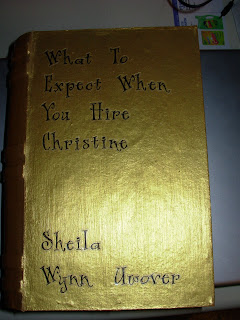I joke with former coworkers about my escape plan from my current job and the progress I'm making - or not making, really. There was the private housekeeper job at the home of the Dollar General founder and his wife, a children's book writer. How could I not get hired with my hotel and bed-and-breakfast experience, or my enthusiasm? There was the reporter job at the Nashville Business Journal, for which I was unqualified, but the editor interviewed me anyway because I was so determined. Some brokers who left the office where I currently work asked if I'd like to interview to be their assistant at the new firm, but the other two men on their new team hired an assistant that had just returned to the city after living in Kentucky. I did my best to procure an assistant job at Thomas Nelson Publishers under the VP of Marketing, sending notes and, finally, a cardboard book with three boxes inside. The title was, "What To Expect When You Hire Christine"; one box said "Save" with a fake watch inside to represent time, one box said "Make" with a roll of fake money inside, and one box said "Have" with a ball inside. Then Thomas Nelson Publishers instituted a hiring freeze. Three weeks later, they laid off ten percent of their workforce.



On the 13th of this month, I submitted my application to Teach For America. Last year, nearly 25,000 applicants applied for 3,700 positions. The date was the final date for submission out of four possible dates, but I had just read that they were going to be starting a corps in Nashville on the 12th. I filled out the application in two nights, including the 500-word essay, the 500-word letter of intent, and the 500-word description of how I overcame an obstacle. Over the ensuing week and half, I began to really see myself as a teacher, planning out lessons in my head. I felt sure that my life experiences and hard work supporting myself during college would be positive points, but as of yesterday, I was officially rejected. Never mind that they only have a limited number of positions, and I was probably only one of thousands who were rejected; it still stung a little. I decided long before that, though, that I would not be too disappointed and would apply again at the first deadline for next year.
The experience at least pushed to the fore my lingering desire to teach, the desire I've squelched for so long for lack of funds. I could try for Nashville Teacher Fellows next year, too, which is a similar program, and if I could raise the money, I could go to Western Governor's University to study teaching over the next few years. There are other options. I just need a day or to to heal from yet another bruising.
